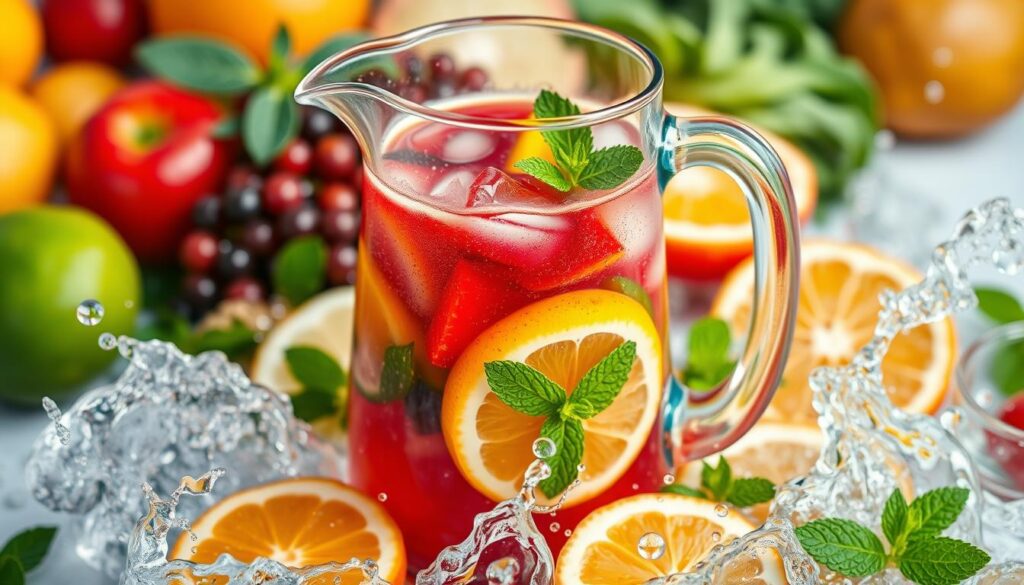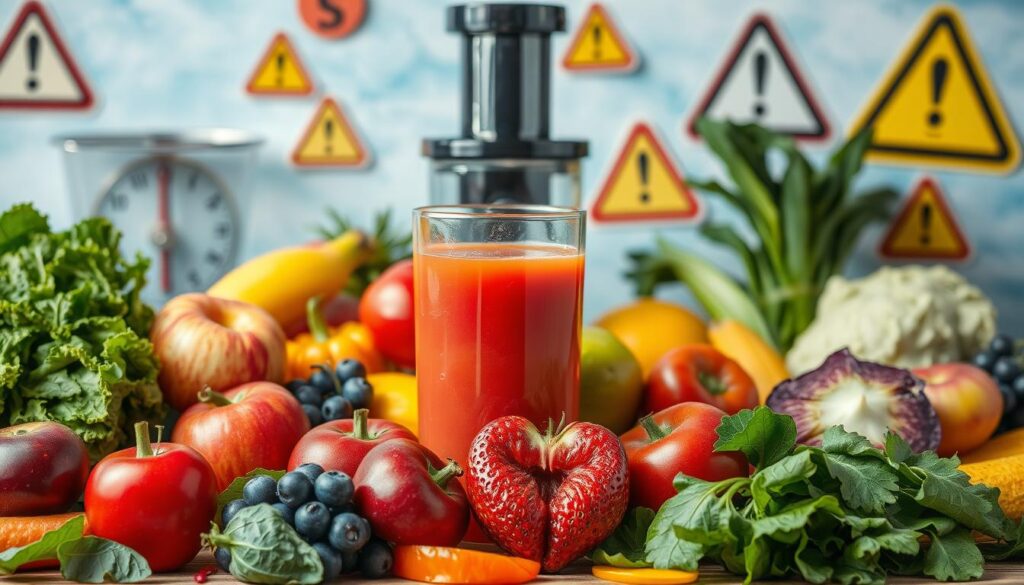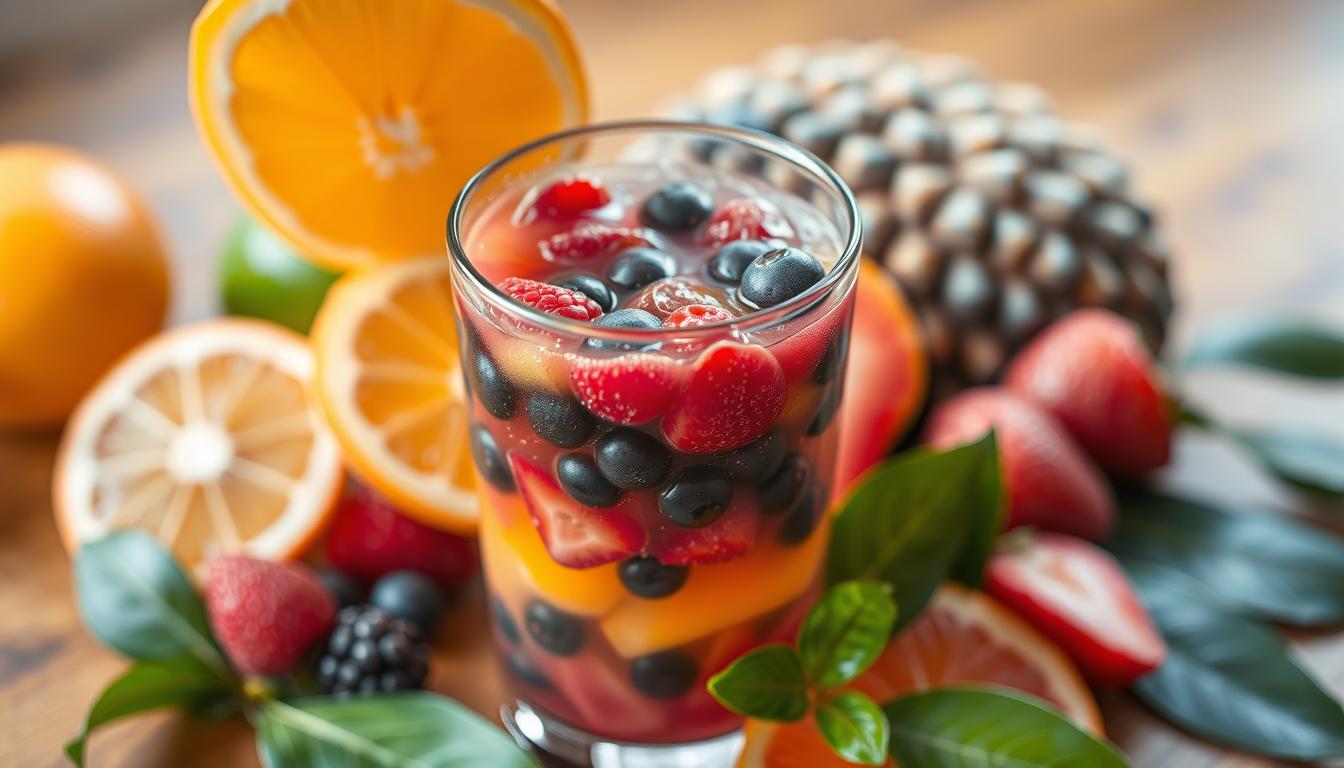I’ve always believed that liquid nutrition is more than just food. It’s about drinking healthy drinks that nourish and hydrate us. Drinking water and juices is a simple way to get important vitamins and minerals. It helps us stay healthy and full of energy.
By adding liquid nutrition to our daily lives, we do more than just quench our thirst. We boost our well-being and add vitality to our lives.
Key Takeaways
- Engaging in liquid nutrition is an efficient means to enhance overall wellness.
- Healthy drinks, including water and juices, play a vital role in maintaining hydration.
- The historical shift towards juice consumption reflects a cultural shift towards healthier lifestyles.
- Nutrient-dense juices supply valuable vitamins and minerals with varying caloric contents.
- While juicing removes fiber content, blending fruits and vegetables retains these important nutrients.
- Prioritize juice safety by choosing pasteurized products and avoiding unpasteurized cleanses, especially for certain populations.
- Consulting a healthcare professional is crucial before commencing any significant dietary changes like juice fasts.
Understanding Full Liquid Diets and Their Uses
Let’s dive into full liquid diets and their importance. A full liquid diet includes foods that become liquid at room temperature. It helps keep energy and nutrients up while managing health issues.
People getting ready for or recovering from surgery find nutrient-rich liquids very helpful. This diet is also key for those with swallowing problems.
What Constitutes a Full Liquid Diet
A full liquid diet includes teas, broths, and juices without pulp. It also has milkshakes and smoothies for extra nutrition. Here’s what a daily menu might look like:
- Breakfast: a glass of juice without pulp, a bowl of gelatin, and tea with milk
- Mid-morning snack: a protein shake or a nutritional supplement drink
- Lunch: broth and a smoothie made with yogurt and a liquid multivitamin
- Afternoon snack: cream soup and fruit-flavored ice
- Dinner: more broth and a custard-style yogurt
- Evening snack: more gelatin and hot chocolate
Medical Contexts Necessitating Liquid Nutrition
Pre-surgery nutrition and post-operation diet changes often require a full liquid diet. It helps patients get the vitamins and minerals they need. It also makes digestion easier.
Transitioning from Solid Foods to Liquid Diets
Switching to a full liquid diet needs a slow start. It’s especially true for those preparing for or recovering from surgery. The process involves replacing solid foods with blenderized versions. For more on liquid diets and wellness, check out the Water Diet Blog website.
| Time of Day | Meal Type | Typical Foods |
|---|---|---|
| Breakfast | Liquid | Juice, Gelatin, Tea with Milk |
| Mid-morning | Snack | Protein Shake or Nutritional Drink |
| Lunch | Liquid | Broth, Yogurt Smoothie with Multivitamin |
| Afternoon | Snack | Cream Soup, Fruit Ice |
| Dinner | Liquid | Broth, Custard-style Yogurt |
| Evening | Snack | Gelatin, Hot Chocolate |
Understanding liquid diet plans helps us meet various nutritional needs. It supports recovery and keeps health in check.
Liquid Nutrition: Combining Water and Juices for a Healthier You
Exploring liquid nutrition changed how I live healthy. Mixing water and juices added natural vitamins and minerals to my diet. It also brought new flavors to my hydration routine. Seeing juicing for health as a lasting choice, not just a trend, is key to better well-being.

Water is vital for our bodies, helping with metabolism and organ function. Adding juices, especially from organic sources, boosts our nutrition. This mix hydrates and strengthens our bodies with antioxidants, aids digestion, and can improve skin health.
- Better hydration: Juices make water more enjoyable, helping us drink more throughout the day.
- Boosted nutrient intake: Juices from fruits and veggies increase vitamins, minerals, and antioxidants in our diet.
- Support for detoxification: Water and juices help remove toxins, aiding in detox processes.
It’s not about picking water or juices; it’s about finding a balance. On active days, I drink electrolyte-rich juices to replace lost minerals. On calm days, herbal teas and water keep me hydrated without extra calories.
By mixing water and juices, we focus on juicing for health. This approach ensures we stay hydrated and get vital nutrients, leading to a healthier lifestyle.
The Health Benefits of Staying Hydrated with Water and Juices
Keeping our bodies hydrated is key for body function optimization. Drinking water or healthy drinks like juices helps a lot. Water keeps us hydrated, while juices give us quick vitamins and minerals.
Optimizing Body Functions through Adequate Hydration
Drinking enough water and healthy drinks makes our body work better. Water helps move nutrients, keeps us cool, and removes waste. The U.S. National Academies of Sciences say we need 15.5 cups of fluid a day. This helps avoid problems like constipation and kidney stones.
Enhancing Nutrient Absorption with Juices
Juices work well with water to help us absorb nutrients better. Even though they don’t have as much fiber as whole fruits, they pack a lot of vitamins. They’re great for those who have trouble digesting or want more vitamins easily. But, it’s important to drink juices in moderation to keep our diet balanced.
In summary, using water and healthy drinks like juices is good for our health. It helps our body work better and boosts nutrient absorption. By adding these drinks to our daily routine, we support our health and stay hydrated.
Navigating the Pros and Cons of Juice Cleanses
Juice cleanses are often seen as a quick way to lose weight and detox. But, they have both supporters and critics. We will look into the myths and facts about juice diets. We’ll focus on how they affect digestion and weight.
Debunking Myths Around Juice Cleansing
Many think juice cleanses are key for detoxing the body. But, our bodies already have organs like the liver and kidneys to remove toxins. Juice fasting might give the digestive system a break, but it’s important to think about the lack of nutrients and health risks.
Understanding the Impact on Digestion and Weight Management
Juicing removes fiber from fruits and veggies, which helps with digestion. While a short juice diet might help digestion, relying on it too long can harm gut health and bowel functions. Juice diets can lead to quick weight loss, but this weight often comes back when you start eating regular food again. This can lead to unhealthy weight cycling.
Let’s take a closer look at juice cleanses:
| Duration | Daily Intake | Common Components | Possible Side Effects |
|---|---|---|---|
| 1-3 days (plus preparation and post-cleanse) |
800-1,200 calories | Raw organic juices Almond, cashew, coconut milk |
Headaches, fatigue, stomach pain |
| 3-21 days (long-term) | Limited proteins No solid foods |
Gluten-free vegan options No processed foods or caffeine |
Hunger pangs, changes in bowel function |

In summary, juice cleanses might help with short-term weight loss and seem like a healthier choice. But, the health risks and effects on digestion and weight management are big concerns to think about.
Integrating Juice into Your Daily Diet Responsibly
Adding juice to your diet can boost your daily nutrition and help you eat more balanced. But, it’s key to juice responsibly to get the most benefits without upsetting your diet balance.
Getting the hang of responsible juicing means knowing juices are great for vitamins and minerals. They should add to your diet, not take over. Juicing is a good way to get more nutrients, especially when eating whole fruits and veggies is hard.
Juicers like Omega and Hurom keep nutrients and enzymes in your juice. They’re better than other juicers for leafy greens and keep juice fresh longer. For tips on juicing in a balanced diet, check out this useful guide.
| Juicer Type | Benefits | Ideal For |
|---|---|---|
| Masticating Juicers | Less oxidation, quieter, can store juice for up to 3 days | Leafy greens and varied produce |
| Centrifugal Juicers | Cost-effective, fast juice extraction | Quick consumption, less preparation time |
| Twin Gear Juicers | Preserves cellular structure, maximizes nutrient extraction | Enthusiasts seeking the highest nutrient quality |
Here’s a tip: mix veggies and fruits in your juice. It tastes better and is full of nutrients. Fresh produce is best for the most nutrients and less risk of bacteria.
Also, pick pasteurized juices for safety, especially if you won’t drink it right away. Organic, fresh juice is the best choice for a healthy, responsible juicing routine.
In conclusion, adding juice to your day can be fun and healthy. But, do it thoughtfully to keep your diet balanced. It’s about making healthy choices for better health, not just drinking juice.
Maximizing Nutrient Intake with Nutrient-Rich Liquids
Welcome to my insights on how to boost juice nutrition and choose healthy drinks. I’ll share key juicing tips and guide you on picking the best produce for homemade juices. Let’s explore how to make your blends more nutritious.
Choosing the Right Fruits and Vegetables for Juicing
Picking the right fruits and vegetables is key for nutrient-rich juices. A mix of colors ensures a wide range of vitamins, minerals, and antioxidants. Juicing is about taste and nutrition.
- For high vitamin content, dark leafy greens like spinach and kale are great. They’re packed with vitamins A, C, and K.
- For antioxidants, blueberries and raspberries are excellent choices.
- For a smooth liquid, cucumbers and celery work well.
It’s also good to use whole fruits and vegetables to keep fiber. This is important because fiber is often lost when juicing. Blending techniques can help keep more nutrients in your juices.
Tips for Making Nutrient-Packed Juices at Home
Making your own juices lets you control what goes in. This way, you can make sure your drinks are fresh and tailored to your needs. Here are some tips:
- Begin with mild veggies like carrots or apples for sweetness without too much sugar.
- Add a bit of ginger or turmeric for anti-inflammatory benefits.
- For creaminess and healthy fats, add a slice of avocado.
By following these steps, you can create tasty, nutrient-rich juices that are good for you.
| Produce Type | Nutrient Focus | Health Benefit |
|---|---|---|
| Leafy Greens | Vitamins A, C, K | Improves skin, eye health, and blood clotting. |
| Berries | Antioxidants | Combats oxidative stress, reduces inflammation. |
| Citrus Fruits | Vitamin C | Boosts immunity, enhances iron absorption. |
Good health is about what you eat, not just what you avoid. With a juicer and fresh produce, start your day with a nutritious drink. Let’s make healthier choices, one glass at a time!
Conclusion
Water and juices are key to good health. They make up a big part of a healthy diet. This is especially true when we avoid ultra-processed foods, which are common in the US.
Following the Dietary Guidelines for Americans 2020–2025 is crucial. This ensures our liquid diet gives us the right amount of calories and nutrients. It’s all about finding the right balance for each person.
Studies have shown that a 3-day juice-only diet can lead to weight loss. But, we need to be careful. There’s not enough proof that detox diets work, and they can be harmful. It’s also important to watch out for juices with too much sugar.
Looking at 100% fruit juice, we see it’s okay in moderation. But it should be part of a varied diet, not the main thing we eat.
Remember, solid foods are important for getting all the nutrients we need. They help keep our muscles strong. So, let’s make juices a part of our diet, but not the only thing we eat.
My advice is to make your own juices. Choose ones that are low in sugar and high in nutrients. This way, you can enjoy the benefits of liquid nutrition while staying healthy.




